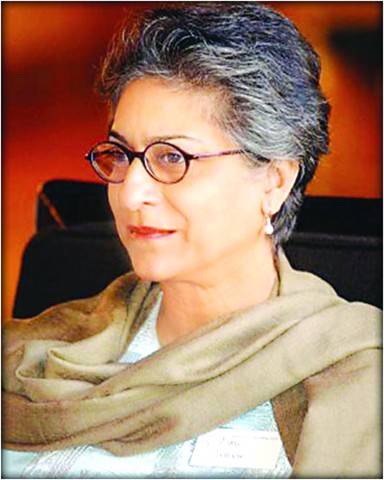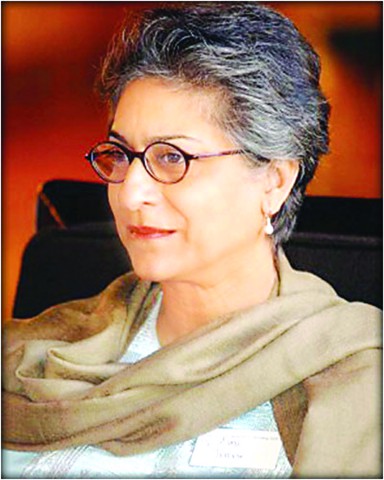
Pakistan has been fortunate to have the benefit of many women crusaders and icons to uphold the rights of the poor and the downtrodden and to fight for human rights and women’s rights. Luminaries like Fatima Jinnah, Begum Rana Liaquat Ali, Benazir Bhutto, Bilqees Edhi, Malala Yusufzai, Shamshad Akhtar, Yasmeen Lari, Ayesha Jalal, Altaf Fatima, Sharmeen Obaid Chinoy are all ladies who have done us proud and projected the soft and cultured image of Pakistan. Shining bright across the national horizon and blazing a bright trail of achievements, the name of Asma Jehangir stands out as an epitome of truth and tireless struggle for human rights and women empowerment.
This larger-than-life lady spent her entire adult life fighting for and defending human and women’s rights. She fought tooth and nail for the rights of non-Muslim minorities and children. She had the audacity to speak out and criticize the Hudood Ordinance and the blasphemy laws introduced by the Islamisation program of Ziaul Haque. She was a founding member of the Human Rights Commission of Pakistan and subsequently served as secretary general and chairperson of the commission.

Her entire life is a shining example of fighting for the rights of other people, ordinary citizens, the downtrodden and the victimized members of society. She was a born idealist who had the guts to challenge the most powerful institutions and individuals of the country. Asma was that very rare breed of individuals who not only promoted idealism but also had the courage to take to the barricades to flaunt her ideas about human rights, democracy and the rule of law. She stood by non-Muslims accused of blasphemy, victims of rape and acid attacks and ordinary citizens who disappeared into detention centers or were just picked up by intelligence spooks. She had the courage to defy the powerful military establishment who she accused of driving the country towards ruin with their stupid strategic games. She had the nerve to publicly challenge the mighty military machine by calling them “useless duffers,” openly challenging the military and the jihadis elements is definitely treading on thin ice or simply asking for trouble. She became a target and was attacked many times. During an anti-Musharaf demonstration in Lahore she braved the clouds of tear gas and shouted at the riot police, “Come on, shoot me!”
Asma was born in Sahiwal in 1953 in a family very active in politics and human rights movement. Malik Ghulam Jilani, her father, was a civil servant turned politician after retirement. He was very active in human rights movement and was arrested many times for opposing military dictators of the time. He was one of the very few politicians in Pakistan to have the guts to denounce the Pakistani government for the genocide in East Pakistan during the military crackdown on the Bengali activists. Asma in fact inherited her love for political activism from her parents because her mother Sabiha Jilani too stood shoulder to shoulder with her husband in all his endeavors. She became involved in social causes and human rights at a very young age. She led protest marches against the military dictators and was the flag bearer in the protests against the detention of her father by Z.A. Bhutto in 1972. Asma also had a very impressive academic record. She was a graduate of Kinnaird College Lahore and then got her law degree or LLB from Punjab University. She was also honored with an honorary doctorate by the universities of St. Gallen, Queens University, Simon Fraser University and Cornell University. She was married and the mother of a son and two daughters.
In 1980, Asma Jehangir along with her sister Hina Jehangir banded together with other lawyers and activists to form the first law firm managed by women in Pakistan and in the same year she established the Women’s Action Forum and launched a legal crusade against all forms of discriminatory laws such as the Hudood Ordinance, where victims of rape had to prove their innocence. In 1983, she defended the case of Safia Bibi, a thirteen-year-old blind domestic servant raped by her employer who was charged with fornication and sentenced to flogging and three years in Jail. The sentence was eventually overturned by a court due to the efforts of Asma Jehangir. In 1986, she set up a legal aid center that provides relief and aid to victims of discriminatory laws in Pakistan. She was a great champion of protecting the rights of religious minorities and spoke out loudly against forcible conversions. She also ran a shelter called Dastak that provided an abode to battered and victimized women.
After an illustrious career in law and human rights struggle, this epitome of courage died in Lahore in February 2018. Her funeral was one of the biggest ever seen. Thousands of lawyers, women, Hindus, Christians and ordinary citizens paid their last homage. Rest in peace, Asma. You are badly missed.

This larger-than-life lady spent her entire adult life fighting for and defending human and women’s rights. She fought tooth and nail for the rights of non-Muslim minorities and children. She had the audacity to speak out and criticize the Hudood Ordinance and the blasphemy laws introduced by the Islamisation program of Ziaul Haque. She was a founding member of the Human Rights Commission of Pakistan and subsequently served as secretary general and chairperson of the commission.

Her entire life is a shining example of fighting for the rights of other people, ordinary citizens, the downtrodden and the victimized members of society. She was a born idealist who had the guts to challenge the most powerful institutions and individuals of the country. Asma was that very rare breed of individuals who not only promoted idealism but also had the courage to take to the barricades to flaunt her ideas about human rights, democracy and the rule of law. She stood by non-Muslims accused of blasphemy, victims of rape and acid attacks and ordinary citizens who disappeared into detention centers or were just picked up by intelligence spooks. She had the courage to defy the powerful military establishment who she accused of driving the country towards ruin with their stupid strategic games. She had the nerve to publicly challenge the mighty military machine by calling them “useless duffers,” openly challenging the military and the jihadis elements is definitely treading on thin ice or simply asking for trouble. She became a target and was attacked many times. During an anti-Musharaf demonstration in Lahore she braved the clouds of tear gas and shouted at the riot police, “Come on, shoot me!”
Asma was born in Sahiwal in 1953 in a family very active in politics and human rights movement. Malik Ghulam Jilani, her father, was a civil servant turned politician after retirement. He was very active in human rights movement and was arrested many times for opposing military dictators of the time. He was one of the very few politicians in Pakistan to have the guts to denounce the Pakistani government for the genocide in East Pakistan during the military crackdown on the Bengali activists. Asma in fact inherited her love for political activism from her parents because her mother Sabiha Jilani too stood shoulder to shoulder with her husband in all his endeavors. She became involved in social causes and human rights at a very young age. She led protest marches against the military dictators and was the flag bearer in the protests against the detention of her father by Z.A. Bhutto in 1972. Asma also had a very impressive academic record. She was a graduate of Kinnaird College Lahore and then got her law degree or LLB from Punjab University. She was also honored with an honorary doctorate by the universities of St. Gallen, Queens University, Simon Fraser University and Cornell University. She was married and the mother of a son and two daughters.
After an illustrious career in law and human rights struggle, this epitome of courage died in Lahore in February 2018. Her funeral was one of the biggest ever seen
In 1980, Asma Jehangir along with her sister Hina Jehangir banded together with other lawyers and activists to form the first law firm managed by women in Pakistan and in the same year she established the Women’s Action Forum and launched a legal crusade against all forms of discriminatory laws such as the Hudood Ordinance, where victims of rape had to prove their innocence. In 1983, she defended the case of Safia Bibi, a thirteen-year-old blind domestic servant raped by her employer who was charged with fornication and sentenced to flogging and three years in Jail. The sentence was eventually overturned by a court due to the efforts of Asma Jehangir. In 1986, she set up a legal aid center that provides relief and aid to victims of discriminatory laws in Pakistan. She was a great champion of protecting the rights of religious minorities and spoke out loudly against forcible conversions. She also ran a shelter called Dastak that provided an abode to battered and victimized women.
After an illustrious career in law and human rights struggle, this epitome of courage died in Lahore in February 2018. Her funeral was one of the biggest ever seen. Thousands of lawyers, women, Hindus, Christians and ordinary citizens paid their last homage. Rest in peace, Asma. You are badly missed.


